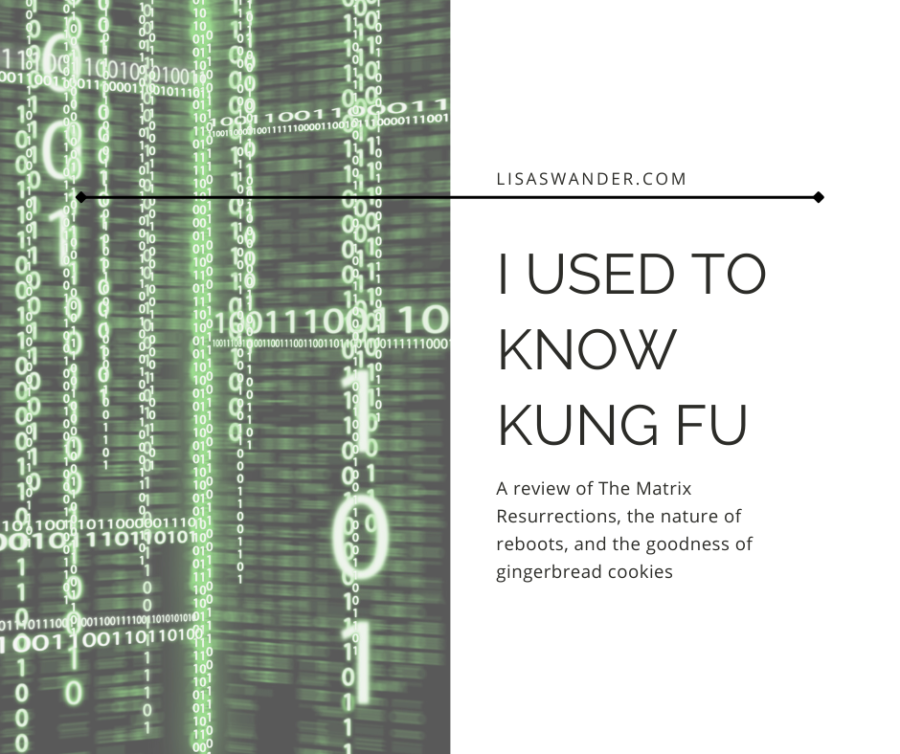Before we talk about The Matrix Resurrections, you should know that I make a life-changing gingerbread cookie.
It’s spicy and chewy and slightly crisp around the edges, and I’ve made it every December for three years. The dough forms perfectly discrete gingerbread people—no monstrous spreading or puffiness—and pairs with a light buttercream and cinnamon imperial buttons. Through successive Christmases, I’ve honed the production to the point that, if I’d needed a gift to lay at Mary’s feet beside the frankincense and myrrh, it would have been this cookie. It will change your life.
But it can only do so once.
Once you’ve tasted the cookie, you enter into the second part of your existence, the post-gingerbread cookie phase of your life. Your personal timeline has split, and your consciousness will adapt to the knowledge that such deliciousness exists. You’ll reach for another cookie, and while its gingery flavor will be exactly the same, the experience of eating it will not.
This is because you are not the same.
To reclaim the rush of the original bite, you would need a way to return to the original you. Pre-cookie you. But you can’t. She no longer exists. So instead, you eat another cookie, then another. You taste little and feel less. You reach for another, driven no longer by flavor or reason but by the vain, fruitless hope that if you just keep coming back, you might catch the unreachable version of yourself that was once transformed by molasses and cloves and frosting.
That’s what watching The Matrix Resurrections is like.
I mean, it’s what all the Matrix sequels are like. The original Matrix was a life-changing movie. Okay, so no, the idea that we’re sleepwalking through a version of reality wasn’t new—Plato, the Apostle Paul, etc.—but for most of us it wasn’t visceral until we saw Keanu working it out on the big screen (or DVD and Blue Ray!) in 1999.
Twenty-three years later, you can’t have a discussion about dystopian fiction without someone bringing up The Matrix. I can’t think about anything existential without bringing it up in my own head. Even people who haven’t seen the movie know what you’re talking about if you say you feel like you’re living in the Matrix. It’s a shorthand for feeling existentially out of control, out of body, and out of place.
It changed our discourse, and so it changed us.
And we’ll never taste anything quite that spicy again.
To be fair, Resurrections seems to understand this. It spends much of its time climbing a spiral staircase of meta exposition (mexposition?) rather than attempting to re-blow our minds with new ways of considering the human experience. There are flashes of scenes from the first three movies, both to get the nostalgia fountain flowing and to remind us we didn’t know what the heck happened at the end of Revolutions. There are bullet time fight scenes and telephones and portals and women with short haircuts.
And it goes down like your fourth gingerbread cookie—tasty, yet not quite what you wished it would be. It’s fine.
It’s fine! Keanu and Carrie Ann Moss are fine, in all senses of the word, and even Jonathan Groff will take you from grieving the absence of Hugo Weaving to hoping Agent Smith might burst through that next dingy warehouse door with a big musical number. The new cast members are likable and very fashion-forward, and there’s a trackable, if sappy, narrative about Neo and Trinity’s star-crossed love that holds the story together serviceably enough.
You don’t need me to summarize the plot, partially because I’m not sure I understood it, but also because The One mythology has never housed the nougaty center of these films anyway. Instead, it’s been in the framing of the world, in the little snippets of philosophy tucked into dinner conversations and villain monologues, that you’ve found something to puzzle about til your puzzler was sore.
Luckily, Resurrections still has some of that.
My favorite, posited by Neil Patrick Harris’ architect character, is that it’s not that hard to control humans. All you have to do is keep us in a purgatory between having what we need and yearning for what we want, and we’ll be paralyzed by dissatisfaction forever.
Now that is meta, because it’s the essence of every nostalgia grab ever. Reboots, reunions, repurposings—they strike you right in that soft-bellied place between yearning for what you cannot have (the magic of your youth) and settling for what you can (a pantomime of a TV show from said youth).
It’s a state of chronic longing, and when you also consider that nostalgia was long considered a mental illness, it may explain why you turned off the new Saved by the Bell feeling more like a human battery than a joyful child.
With all that said, I don’t NOT recommend watching The Matrix: Resurrections. I just recommend that you manage your expectations beforehand. The gingerbread has been eaten, and unless you can convince yourself that, oh I don’t know, THERE IS NO GINGERBREAD, I suggest you make peace with the current timeline before you jack back in to that one.


